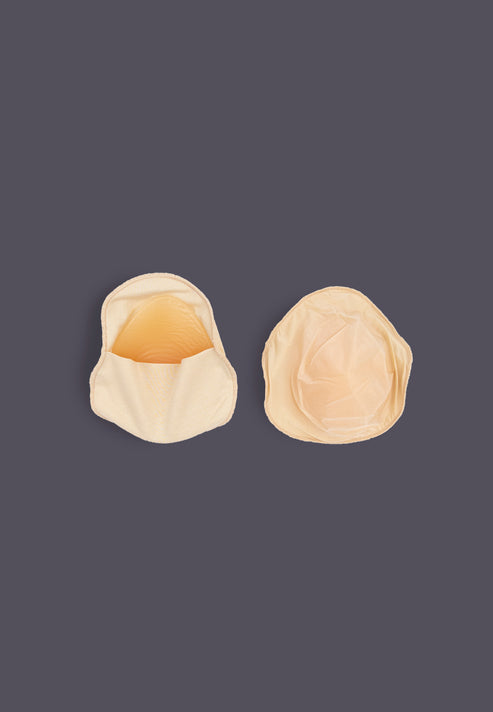Transgender Info Point Q&A / Trans Q&A
In the fall of 2023, UNTAG visited the Transgender Info Point in Ghent, located in the heart of the University Hospital. We asked them questions regarding safe binding, the best way to tuck, and other related inquiries. We covered a lot of information that is useful to know if you're new to the world of gender-affirming products, and if you have more experience, it's good to stay informed about recent developments and advice.
Click here to read the full interview with Transgender Info Point.
What is the general advice for dealing with gender dysphoria?
Three tips that can alleviate gender dysphoria are:
- Talk about your dysphoria with people close to you.
- Seek representation in movies or talk about your dysphoria with people who have similar experiences.
- Look for gender-affirming items or accessories that can help your body appear more in line with how you feel.
A good source of information and tips on gender dysphoria is www.gendervonk.be.
What is the general advice for wearing tucking underwear?
There are some general guidelines to follow when wearing tucking underwear, such as:
- Don't wear the underwear for more than 8 hours a day.
- Don't wear the underwear while sleeping.
- If you experience pain or discomfort, refrain from wearing the underwear for a few days, or wear it less frequently for a while.
- Purchase high-quality tucking underwear.
Can you use tape for tucking?
Realistically, yes you can use tape for tucking, but follow these pieces of advice:
- Ensure the tape is safe for use on the body, for example, do not use duct tape.
- It is preferable to use tucking underwear rather than tape.
Keep in mind that comprehensive medical research on the long-term effects of tucking with tape has not been conducted.
Which tucking technique is the safest for the male reproductive system?
There are no definitive medical conclusions regarding the long-term effects of tucking. Concerning the reproductive system, wearing tucking underwear might potentially have an impact on it because it creates a warm and humid environment. However, there is no definitive answer to this yet. Here are some tips to keep in mind:
- Do not use tape not intended for the body.
- Avoid wearing two pairs of tucking underwear simultaneously; opt for a single high-quality pair.
- Always listen to your body; if your body signals pain, it's time to remove the underwear.
Does tucking affect the urinary system?
Yes, especially when people use tucking tape instead of underwear. Once everything is neatly tucked, individuals often delay using the toilet as long as possible, which can have negative effects on the bladder and kidneys. Additionally, there may not always be gender-inclusive restrooms available, necessitating a delay in restroom visits. For these reasons, it is recommended to wear tucking underwear rather than tape, as it makes it easier to use the restroom.
What is the general advice for wearing binders?
Here are some important points of advice when wearing binders:
- Ensure that the binder you wear is of good quality.
- Take the time to find the brand that suits you best and fits your body well.
- Do not wear your binder for more than 8 hours a day.
- Do not sleep in your binder, not even for short naps.
- Avoid intense workouts while wearing a binder; opt for a snug sports bra instead.
- Always listen to your body; if you experience symptoms like neck or head pain, nausea, dizziness, shortness of breath, or need to take pain relievers constantly, take a break for a few days or consider a binder from a different brand.
How long can you wear a binder?
The duration for which you can wear a binder varies from person to person, but here are some tips:
- It is recommended not to wear your binder for more than 8 hours a day.
- If you find yourself wearing the binder for longer due to school or work, monitor how you feel. Remove it if it becomes painful and schedule a rest period as soon as possible.
- Never wear your binder overnight.
- In theory, you can wear a binder every day if it is of good quality, but still take occasional rest days.
Is it safe to wear a binder before your body is fully developed?
Medically, there are no definitive answers to this question. When the body starts to develop, the same advice is given: do not sleep in your binder, and do not wear it for more than 8 hours a day. At a young age, it's important to avoid wearing a binder for a few days each week. Intensive binder use at a young age can affect the skin's elasticity. More scar tissue can form during a chest removal operation if skin elasticity has been compromised.
How can you safely position your chest in a binder?
There is no one definitive method. The most important thing is to listen to your body. If you experience pain or discomfort, adjust the position of your breasts until it feels better.
Are binders with zippers and closures unsafe?
Binders with zippers are not necessarily unsafe. Binders with zippers or closures are more accessible and can be put on more easily. However, a binder with a side zipper can distribute pressure on the chest and ribs unevenly if it is too small. Avoid binders of this type.
What are tips for binding with tape?
First and foremost, binders are generally recommended over tape. If you do use tape, follow these recommendations:
- Maintain your skin's elasticity with skin oil or lotion.
- Do not wear the tape for more than a few days.
Is there a way to bind without tape or a binder?
The best alternative is a sports bra or wearing oversized clothing.
Can you exercise in a binder?
You can, but the general advice still applies:
- If you find it difficult to breathe during intense exercise, consider switching to a sports bra.
- Sweating during exercise can lead to skin irritation under the binder. Take occasional breaks to pat your body dry with a towel.
- Using talcum or baby powder on your body when putting on the binder can help make it easier to wear.
How should you wash your binder?
Follow the washing instructions provided with the binder you purchased. Usually, the following rules apply:
- Do not put your binder in the dryer.
- Wash your binder on a short cycle with low temperature, or wash it by hand.
- If your binder has shrunk in the wash, don’t wear it anymore.
What activities should you avoid while wearing your binder?
If it's very hot or if you're going to engage in vigorous outdoor activities in the sun, it's better not to wear a binder. Otherwise, you may experience skin irritation, difficulty breathing, excessive sweating, or a tight feeling in the chest.
Can you wear a binder during sexual activities?
Some people wonder if it's possible to wear a binder during sexual activities. Depending on the intensity of the encounter, this should not be a problem, as long as you pay attention to how you feel.
If you want to undergo a mastectomy, do you need to prove how 'trans' or 'non-binary' you are?
10 or 20 years ago, attitudes were more conservative, but today, you do not need to prove this to access gender-affirming care. However, you will need a referral letter from a mental health professional. It's important to establish a good connection with your psychologist, as they can support you throughout your journey.
Are there ways to make your body appear more masculine without hormones?
There are several things you can do to appear more masculine without relying on hormones:
- Tools like binders can be a good starting point.
- Choose a hairstyle with shaved sides.
- Wear shoes with thick soles.
- Experiment with makeup techniques like contouring for a more masculine look.
- Try to let go of stereotypes about what is 'masculine' and discover what makes you feel comfortable.
You can find more information at https://www.transgenderinfo.be/.




